Reflective Question Answers - Social Care Practice at IWA
VerifiedAdded on 2023/04/26
|6
|1366
|146
Homework Assignment
AI Summary
This assignment presents a student's reflective answers regarding their supervised professional practice at the Irish Wheelchair Association (IWA). The answers address key aspects of their role, including duties performed, involvement in staff and client meetings, methods of communication with clients, and achieved learning goals. The student discusses the theories underpinning their practice, relevant national policies, and their development as a reflective and self-aware social care practitioner. Specific details of work with clients, professional strengths, areas for development, and the application of theory in practice are also provided. The assignment offers a detailed overview of the student's experience, demonstrating their understanding of social care principles and their commitment to professional growth.

Running head: REFLECTIVE QUESTION ANSWERS
Reflective Question Answers
Name of the Student
Name of the University
Author note
Reflective Question Answers
Name of the Student
Name of the University
Author note
Paraphrase This Document
Need a fresh take? Get an instant paraphrase of this document with our AI Paraphraser
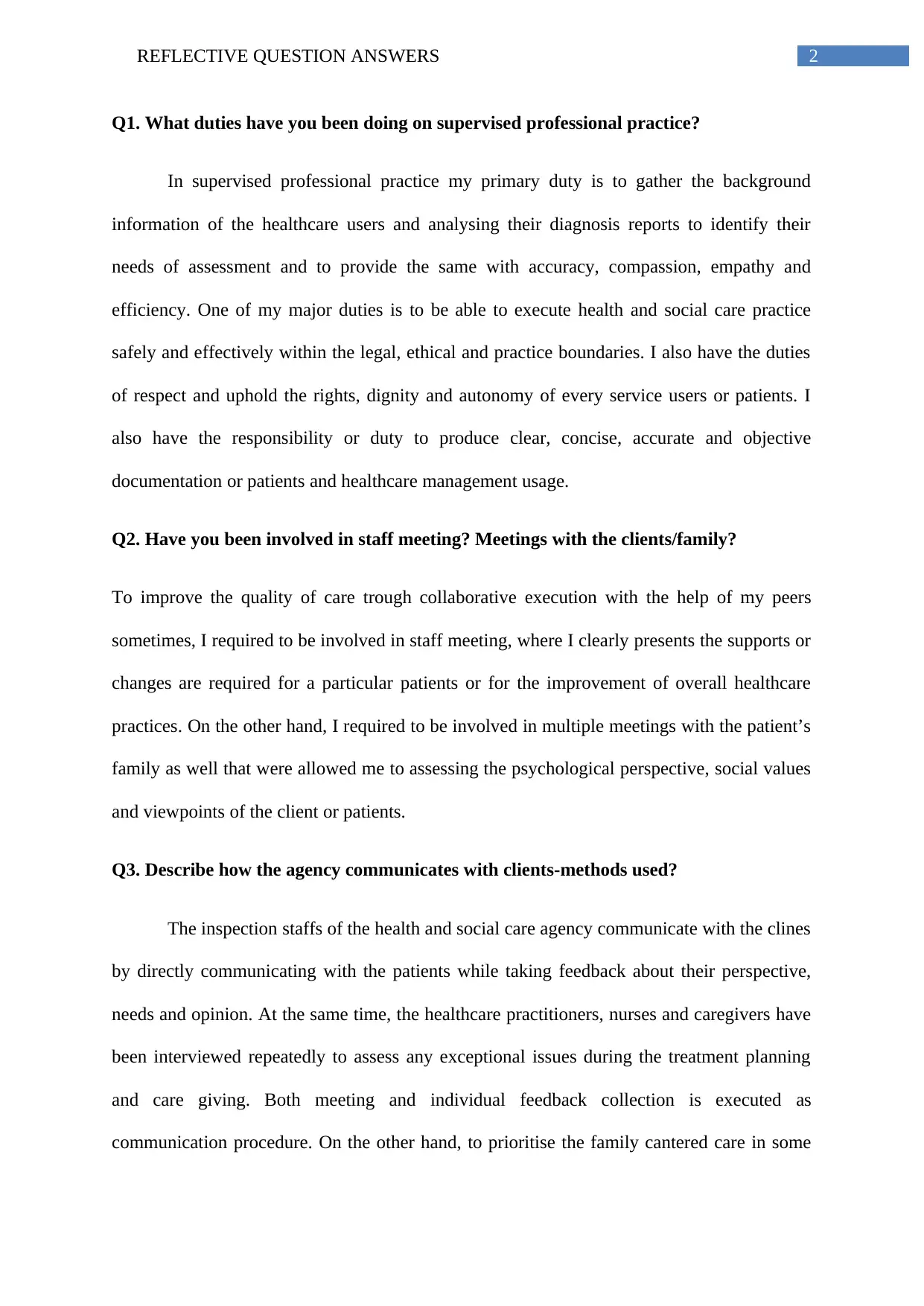
2REFLECTIVE QUESTION ANSWERS
Q1. What duties have you been doing on supervised professional practice?
In supervised professional practice my primary duty is to gather the background
information of the healthcare users and analysing their diagnosis reports to identify their
needs of assessment and to provide the same with accuracy, compassion, empathy and
efficiency. One of my major duties is to be able to execute health and social care practice
safely and effectively within the legal, ethical and practice boundaries. I also have the duties
of respect and uphold the rights, dignity and autonomy of every service users or patients. I
also have the responsibility or duty to produce clear, concise, accurate and objective
documentation or patients and healthcare management usage.
Q2. Have you been involved in staff meeting? Meetings with the clients/family?
To improve the quality of care trough collaborative execution with the help of my peers
sometimes, I required to be involved in staff meeting, where I clearly presents the supports or
changes are required for a particular patients or for the improvement of overall healthcare
practices. On the other hand, I required to be involved in multiple meetings with the patient’s
family as well that were allowed me to assessing the psychological perspective, social values
and viewpoints of the client or patients.
Q3. Describe how the agency communicates with clients-methods used?
The inspection staffs of the health and social care agency communicate with the clines
by directly communicating with the patients while taking feedback about their perspective,
needs and opinion. At the same time, the healthcare practitioners, nurses and caregivers have
been interviewed repeatedly to assess any exceptional issues during the treatment planning
and care giving. Both meeting and individual feedback collection is executed as
communication procedure. On the other hand, to prioritise the family cantered care in some
Q1. What duties have you been doing on supervised professional practice?
In supervised professional practice my primary duty is to gather the background
information of the healthcare users and analysing their diagnosis reports to identify their
needs of assessment and to provide the same with accuracy, compassion, empathy and
efficiency. One of my major duties is to be able to execute health and social care practice
safely and effectively within the legal, ethical and practice boundaries. I also have the duties
of respect and uphold the rights, dignity and autonomy of every service users or patients. I
also have the responsibility or duty to produce clear, concise, accurate and objective
documentation or patients and healthcare management usage.
Q2. Have you been involved in staff meeting? Meetings with the clients/family?
To improve the quality of care trough collaborative execution with the help of my peers
sometimes, I required to be involved in staff meeting, where I clearly presents the supports or
changes are required for a particular patients or for the improvement of overall healthcare
practices. On the other hand, I required to be involved in multiple meetings with the patient’s
family as well that were allowed me to assessing the psychological perspective, social values
and viewpoints of the client or patients.
Q3. Describe how the agency communicates with clients-methods used?
The inspection staffs of the health and social care agency communicate with the clines
by directly communicating with the patients while taking feedback about their perspective,
needs and opinion. At the same time, the healthcare practitioners, nurses and caregivers have
been interviewed repeatedly to assess any exceptional issues during the treatment planning
and care giving. Both meeting and individual feedback collection is executed as
communication procedure. On the other hand, to prioritise the family cantered care in some
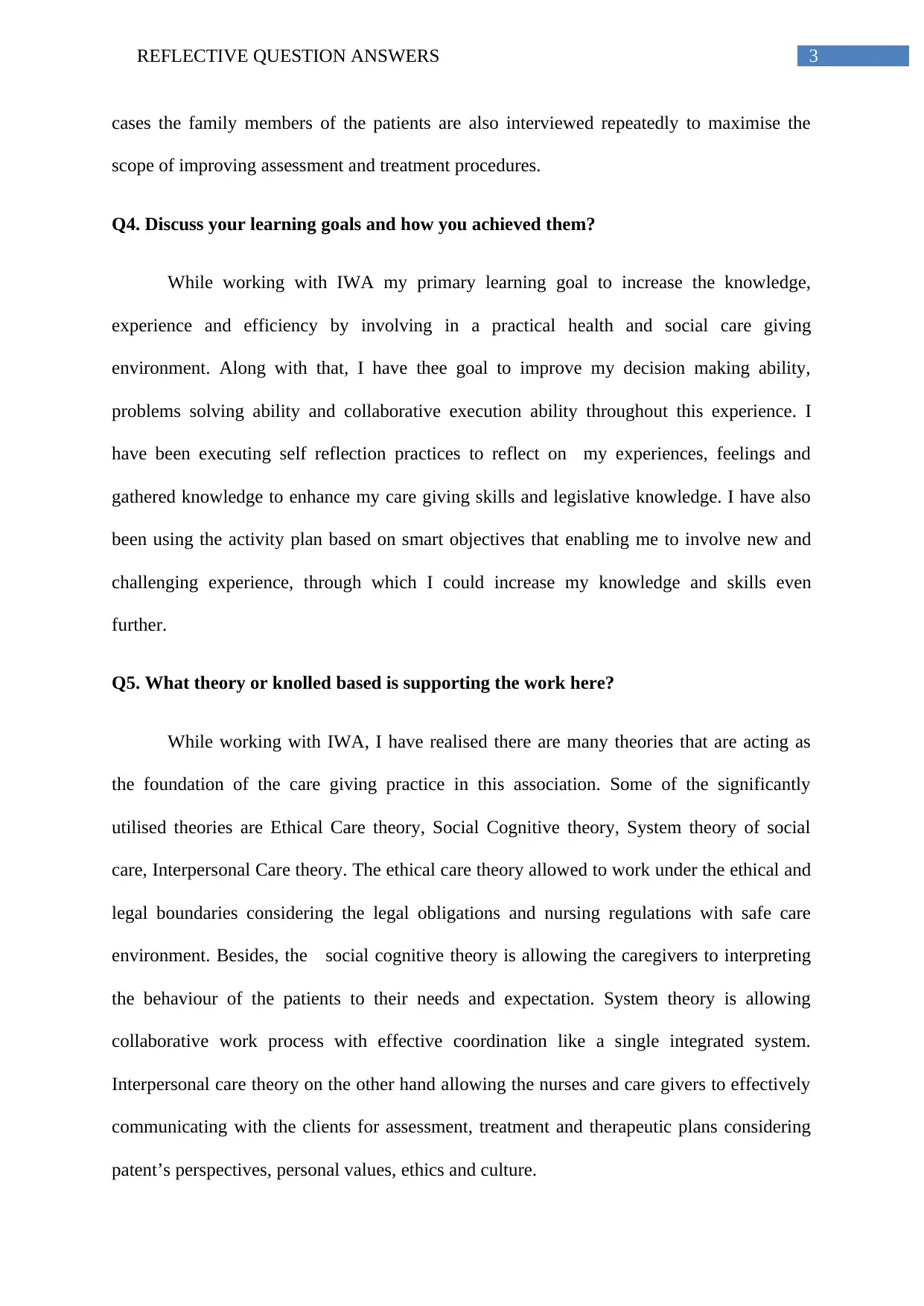
3REFLECTIVE QUESTION ANSWERS
cases the family members of the patients are also interviewed repeatedly to maximise the
scope of improving assessment and treatment procedures.
Q4. Discuss your learning goals and how you achieved them?
While working with IWA my primary learning goal to increase the knowledge,
experience and efficiency by involving in a practical health and social care giving
environment. Along with that, I have thee goal to improve my decision making ability,
problems solving ability and collaborative execution ability throughout this experience. I
have been executing self reflection practices to reflect on my experiences, feelings and
gathered knowledge to enhance my care giving skills and legislative knowledge. I have also
been using the activity plan based on smart objectives that enabling me to involve new and
challenging experience, through which I could increase my knowledge and skills even
further.
Q5. What theory or knolled based is supporting the work here?
While working with IWA, I have realised there are many theories that are acting as
the foundation of the care giving practice in this association. Some of the significantly
utilised theories are Ethical Care theory, Social Cognitive theory, System theory of social
care, Interpersonal Care theory. The ethical care theory allowed to work under the ethical and
legal boundaries considering the legal obligations and nursing regulations with safe care
environment. Besides, the social cognitive theory is allowing the caregivers to interpreting
the behaviour of the patients to their needs and expectation. System theory is allowing
collaborative work process with effective coordination like a single integrated system.
Interpersonal care theory on the other hand allowing the nurses and care givers to effectively
communicating with the clients for assessment, treatment and therapeutic plans considering
patent’s perspectives, personal values, ethics and culture.
cases the family members of the patients are also interviewed repeatedly to maximise the
scope of improving assessment and treatment procedures.
Q4. Discuss your learning goals and how you achieved them?
While working with IWA my primary learning goal to increase the knowledge,
experience and efficiency by involving in a practical health and social care giving
environment. Along with that, I have thee goal to improve my decision making ability,
problems solving ability and collaborative execution ability throughout this experience. I
have been executing self reflection practices to reflect on my experiences, feelings and
gathered knowledge to enhance my care giving skills and legislative knowledge. I have also
been using the activity plan based on smart objectives that enabling me to involve new and
challenging experience, through which I could increase my knowledge and skills even
further.
Q5. What theory or knolled based is supporting the work here?
While working with IWA, I have realised there are many theories that are acting as
the foundation of the care giving practice in this association. Some of the significantly
utilised theories are Ethical Care theory, Social Cognitive theory, System theory of social
care, Interpersonal Care theory. The ethical care theory allowed to work under the ethical and
legal boundaries considering the legal obligations and nursing regulations with safe care
environment. Besides, the social cognitive theory is allowing the caregivers to interpreting
the behaviour of the patients to their needs and expectation. System theory is allowing
collaborative work process with effective coordination like a single integrated system.
Interpersonal care theory on the other hand allowing the nurses and care givers to effectively
communicating with the clients for assessment, treatment and therapeutic plans considering
patent’s perspectives, personal values, ethics and culture.
⊘ This is a preview!⊘
Do you want full access?
Subscribe today to unlock all pages.

Trusted by 1+ million students worldwide
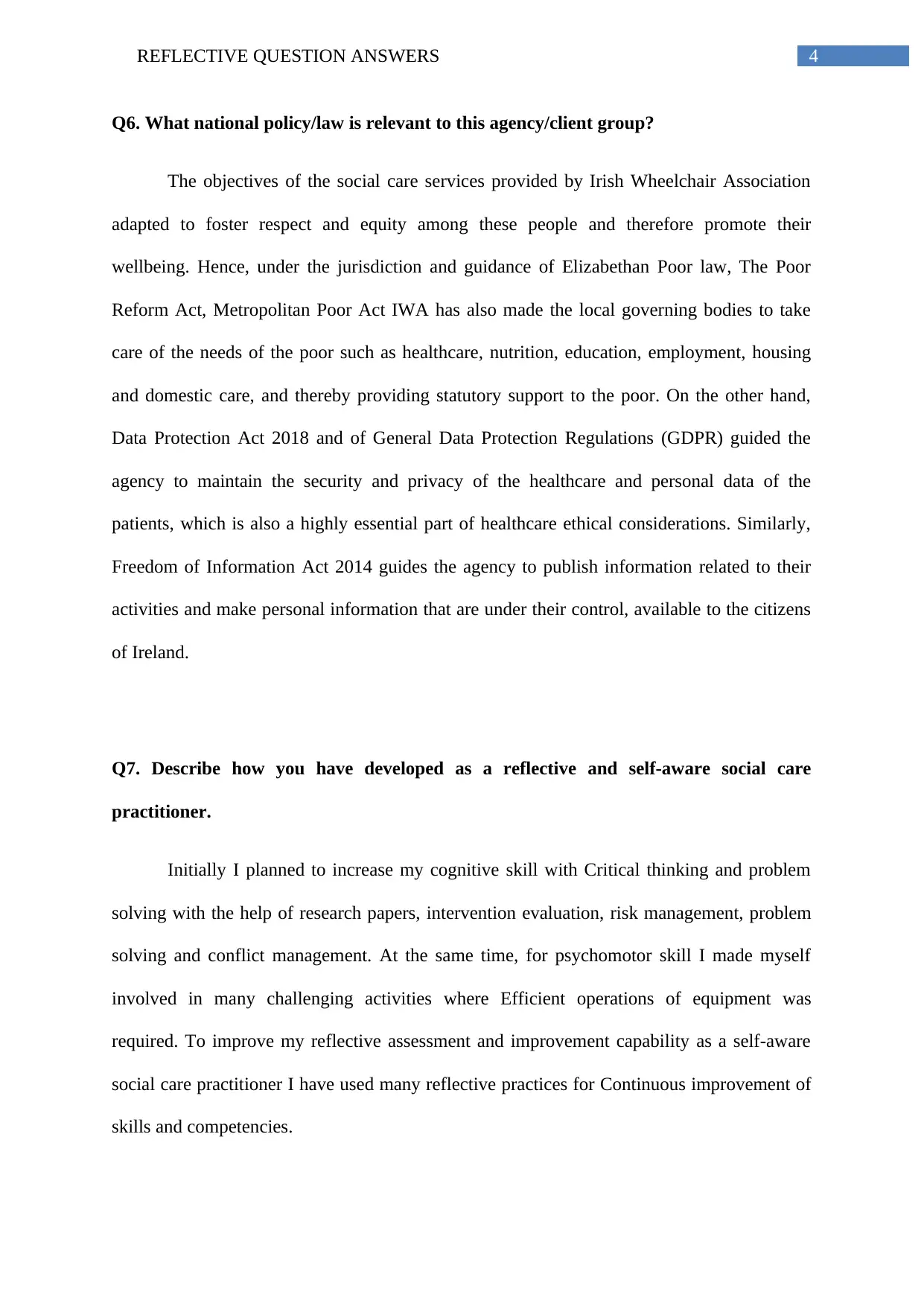
4REFLECTIVE QUESTION ANSWERS
Q6. What national policy/law is relevant to this agency/client group?
The objectives of the social care services provided by Irish Wheelchair Association
adapted to foster respect and equity among these people and therefore promote their
wellbeing. Hence, under the jurisdiction and guidance of Elizabethan Poor law, The Poor
Reform Act, Metropolitan Poor Act IWA has also made the local governing bodies to take
care of the needs of the poor such as healthcare, nutrition, education, employment, housing
and domestic care, and thereby providing statutory support to the poor. On the other hand,
Data Protection Act 2018 and of General Data Protection Regulations (GDPR) guided the
agency to maintain the security and privacy of the healthcare and personal data of the
patients, which is also a highly essential part of healthcare ethical considerations. Similarly,
Freedom of Information Act 2014 guides the agency to publish information related to their
activities and make personal information that are under their control, available to the citizens
of Ireland.
Q7. Describe how you have developed as a reflective and self-aware social care
practitioner.
Initially I planned to increase my cognitive skill with Critical thinking and problem
solving with the help of research papers, intervention evaluation, risk management, problem
solving and conflict management. At the same time, for psychomotor skill I made myself
involved in many challenging activities where Efficient operations of equipment was
required. To improve my reflective assessment and improvement capability as a self-aware
social care practitioner I have used many reflective practices for Continuous improvement of
skills and competencies.
Q6. What national policy/law is relevant to this agency/client group?
The objectives of the social care services provided by Irish Wheelchair Association
adapted to foster respect and equity among these people and therefore promote their
wellbeing. Hence, under the jurisdiction and guidance of Elizabethan Poor law, The Poor
Reform Act, Metropolitan Poor Act IWA has also made the local governing bodies to take
care of the needs of the poor such as healthcare, nutrition, education, employment, housing
and domestic care, and thereby providing statutory support to the poor. On the other hand,
Data Protection Act 2018 and of General Data Protection Regulations (GDPR) guided the
agency to maintain the security and privacy of the healthcare and personal data of the
patients, which is also a highly essential part of healthcare ethical considerations. Similarly,
Freedom of Information Act 2014 guides the agency to publish information related to their
activities and make personal information that are under their control, available to the citizens
of Ireland.
Q7. Describe how you have developed as a reflective and self-aware social care
practitioner.
Initially I planned to increase my cognitive skill with Critical thinking and problem
solving with the help of research papers, intervention evaluation, risk management, problem
solving and conflict management. At the same time, for psychomotor skill I made myself
involved in many challenging activities where Efficient operations of equipment was
required. To improve my reflective assessment and improvement capability as a self-aware
social care practitioner I have used many reflective practices for Continuous improvement of
skills and competencies.
Paraphrase This Document
Need a fresh take? Get an instant paraphrase of this document with our AI Paraphraser
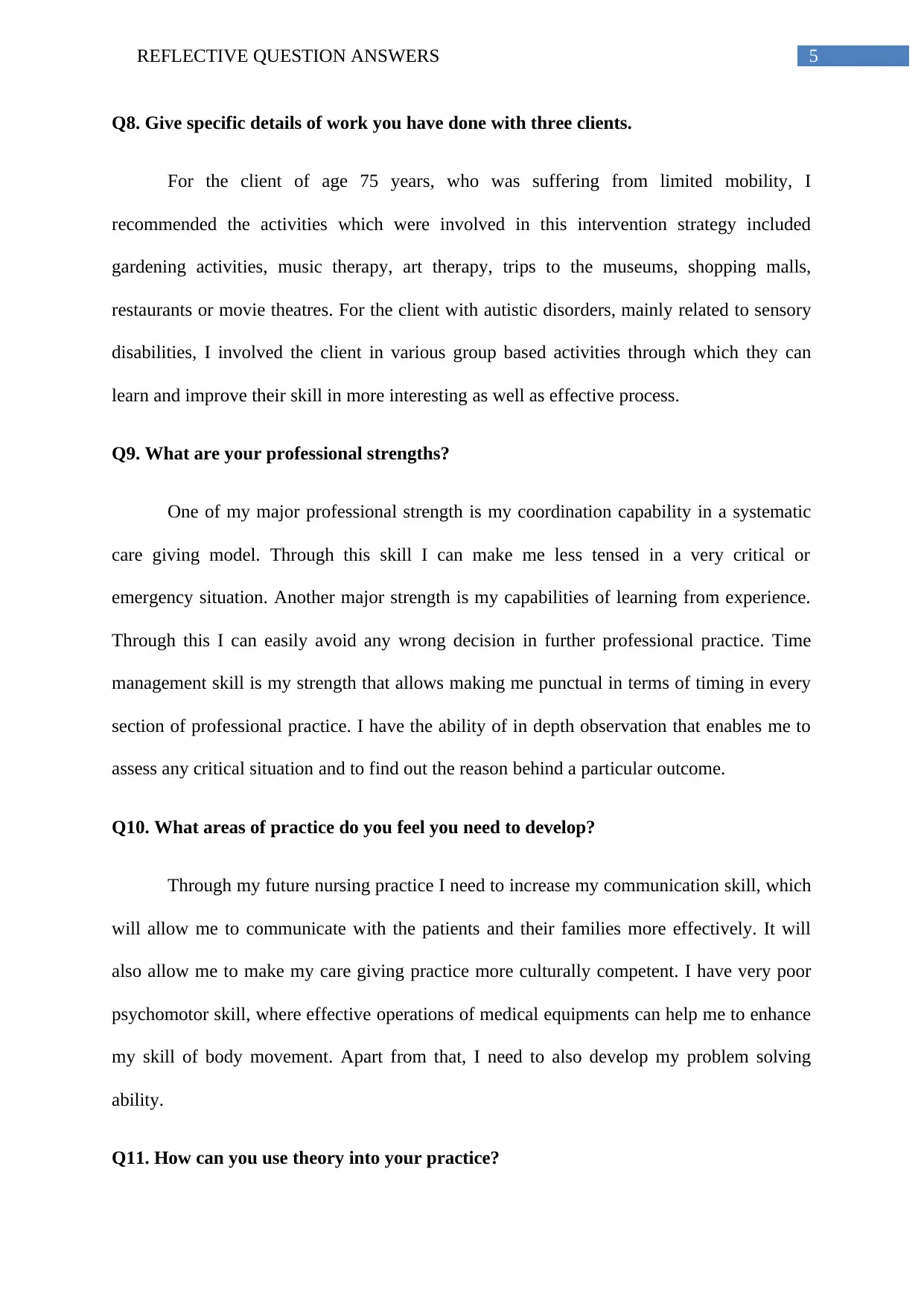
5REFLECTIVE QUESTION ANSWERS
Q8. Give specific details of work you have done with three clients.
For the client of age 75 years, who was suffering from limited mobility, I
recommended the activities which were involved in this intervention strategy included
gardening activities, music therapy, art therapy, trips to the museums, shopping malls,
restaurants or movie theatres. For the client with autistic disorders, mainly related to sensory
disabilities, I involved the client in various group based activities through which they can
learn and improve their skill in more interesting as well as effective process.
Q9. What are your professional strengths?
One of my major professional strength is my coordination capability in a systematic
care giving model. Through this skill I can make me less tensed in a very critical or
emergency situation. Another major strength is my capabilities of learning from experience.
Through this I can easily avoid any wrong decision in further professional practice. Time
management skill is my strength that allows making me punctual in terms of timing in every
section of professional practice. I have the ability of in depth observation that enables me to
assess any critical situation and to find out the reason behind a particular outcome.
Q10. What areas of practice do you feel you need to develop?
Through my future nursing practice I need to increase my communication skill, which
will allow me to communicate with the patients and their families more effectively. It will
also allow me to make my care giving practice more culturally competent. I have very poor
psychomotor skill, where effective operations of medical equipments can help me to enhance
my skill of body movement. Apart from that, I need to also develop my problem solving
ability.
Q11. How can you use theory into your practice?
Q8. Give specific details of work you have done with three clients.
For the client of age 75 years, who was suffering from limited mobility, I
recommended the activities which were involved in this intervention strategy included
gardening activities, music therapy, art therapy, trips to the museums, shopping malls,
restaurants or movie theatres. For the client with autistic disorders, mainly related to sensory
disabilities, I involved the client in various group based activities through which they can
learn and improve their skill in more interesting as well as effective process.
Q9. What are your professional strengths?
One of my major professional strength is my coordination capability in a systematic
care giving model. Through this skill I can make me less tensed in a very critical or
emergency situation. Another major strength is my capabilities of learning from experience.
Through this I can easily avoid any wrong decision in further professional practice. Time
management skill is my strength that allows making me punctual in terms of timing in every
section of professional practice. I have the ability of in depth observation that enables me to
assess any critical situation and to find out the reason behind a particular outcome.
Q10. What areas of practice do you feel you need to develop?
Through my future nursing practice I need to increase my communication skill, which
will allow me to communicate with the patients and their families more effectively. It will
also allow me to make my care giving practice more culturally competent. I have very poor
psychomotor skill, where effective operations of medical equipments can help me to enhance
my skill of body movement. Apart from that, I need to also develop my problem solving
ability.
Q11. How can you use theory into your practice?
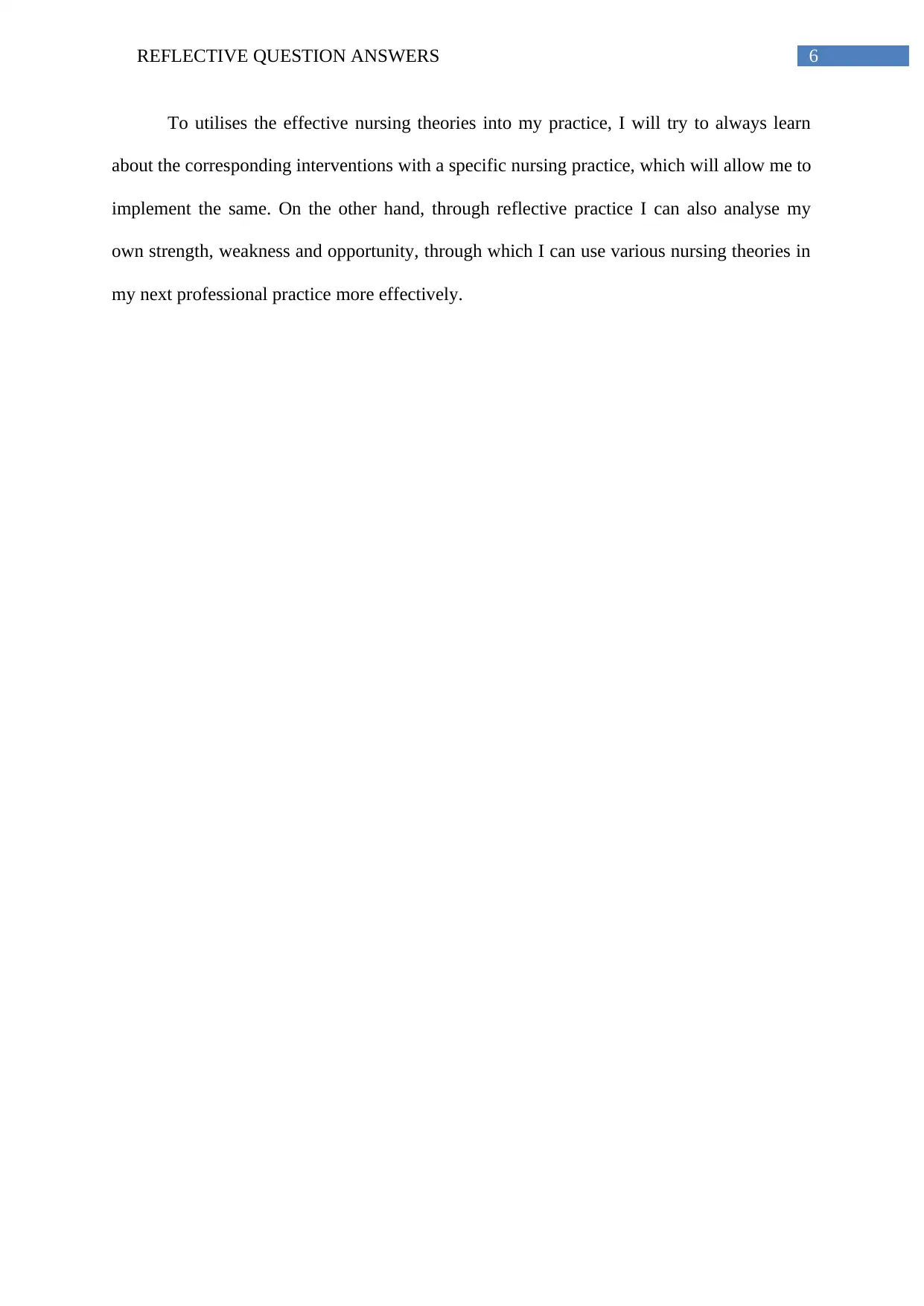
6REFLECTIVE QUESTION ANSWERS
To utilises the effective nursing theories into my practice, I will try to always learn
about the corresponding interventions with a specific nursing practice, which will allow me to
implement the same. On the other hand, through reflective practice I can also analyse my
own strength, weakness and opportunity, through which I can use various nursing theories in
my next professional practice more effectively.
To utilises the effective nursing theories into my practice, I will try to always learn
about the corresponding interventions with a specific nursing practice, which will allow me to
implement the same. On the other hand, through reflective practice I can also analyse my
own strength, weakness and opportunity, through which I can use various nursing theories in
my next professional practice more effectively.
⊘ This is a preview!⊘
Do you want full access?
Subscribe today to unlock all pages.

Trusted by 1+ million students worldwide
1 out of 6
Related Documents
Your All-in-One AI-Powered Toolkit for Academic Success.
+13062052269
info@desklib.com
Available 24*7 on WhatsApp / Email
![[object Object]](/_next/static/media/star-bottom.7253800d.svg)
Unlock your academic potential
Copyright © 2020–2026 A2Z Services. All Rights Reserved. Developed and managed by ZUCOL.





